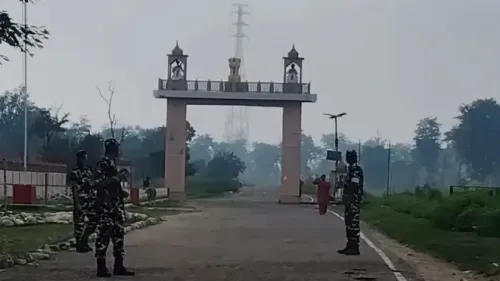Will Chhattisgarh's Security Forces Continue Anti-Maoist Operations Through the Monsoon?

Synopsis
Key Takeaways
- Chhattisgarh security forces are committed to anti-Maoist operations despite monsoon challenges.
- The government has adopted a no-negotiation policy with Maoists.
- Operational strategies will be adjusted to overcome logistical hurdles.
- Community engagement and intelligence-led tactics are key to sustaining momentum.
- Long-term goals include restoring governance and public trust in affected regions.
Raipur, June 15 (NationPress) In light of the recent loss of an Assistant Superintendent of Police during a confrontation with Maoists, security forces in Chhattisgarh will continue their anti-LWE operations without taking a monsoon break.
The Bastar division has made a decisive choice to persist with their anti-Naxal efforts throughout the rainy season.
This determination was solidified during a strategic review meeting on Sunday, according to police sources.
Senior officers from the District Reserve Guard (DRG), Special Task Force (STF), and various other counterinsurgency units convened for this significant meeting.
Discussions centered around modifying operational logistics to meet the challenges introduced by the monsoon, which includes tough terrain, hindered mobility, and communication barriers. Deputy Chief Minister and Home Department head Vijay Sharma emphasized the government's firm stance.
"There will be no additional negotiations with the Maoists," he declared. "You either surrender or face significant consequences."
This strong statement marks a notable shift in policy, highlighting the administration's unwavering commitment. Traditionally, anti-LWE operations experienced a decline during the monsoon season due to logistical difficulties.
Tragically, in a recent incident in the Kunda region of Sukma district, ASP Akash Rao Giripunje lost his life due to a Maoist-placed IED (improvised explosive device) explosion.
This explosion resulted in serious injuries to the SDOP and the officer in charge of the local police station.
In response, security agencies have increased their vigilance, and the government has called for intensified action against the Maoists.
Despite seasonal challenges, the campaign against the outlawed Communist Party of India (Maoist) continues actively across all districts in the Bastar division.
Officials indicated that the rainy season will not hinder the security forces from applying pressure on Maoist strongholds.
"Operations will be adjusted, not halted," a senior police officer remarked, emphasizing the implementation of intelligence-driven strategies and community collaboration to maintain progress.
The Bastar division, comprising several districts with a history of Maoist activity, has witnessed escalated operations under the state's comprehensive counterinsurgency strategy. Initiatives such as "Lone Varratu" and "Poona Narkom" have already contributed to significant surrenders and a reduction in Maoist influence in neighboring areas.
The meeting concluded with a reaffirmation of the state's commitment to a triad approach of "security, development, and trust-building."
Officials reiterated that the objective is not solely to neutralize armed insurgents but also to restore governance and public confidence in remote tribal regions.
As the monsoon nears, the security forces in the Bastar division appear ready to adapt and persevere — rain or shine — in their mission to dismantle the Maoist network and foster enduring peace.
In a related effort, the state government has reassigned nearly a dozen Assistant Superintendents of Police to LWE-affected areas, bolstering the operational strength in conflict-ridden districts.
Each officer is tasked with a clear objective: to eradicate the Maoist threat from their designated regions.








